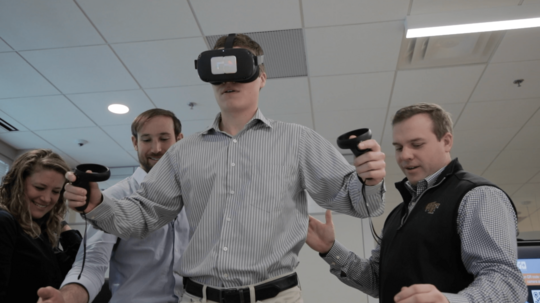
While families, friends and workers around the world try to adapt to working from home and social distancing while maintaining essential human connection during the coronavirus pandemic, one Atlanta company has a solution to bring us together using virtual reality.
"I was hearing these exciting innovative things companies were doing not just to survive in times of chaos but to thrive," Marshall Mosher, CEO of and co-founder of local Atlanta startup Vestigo, said.
Now, Mosher said, is the perfect time for his company to help others connect through VR experiences that help users adapt in difficult situations, bond with coworkers and learn problem-solving skills.
Vestigo, which offers physical team building experiences to meet the needs and core values of the companies they serve, has developed a VR component to its services to accomplish the same goals as their in-person bonding experiences.
"We've moved so much of what we do in VR," he said. "Mainly we're using these experiences that get you in new and unknown and uncomfortable situations."
Navigating the unknown is one of the best things to practice from an innovation standpoint, Mosher said.
"The innovation mindset, the ability to thrive in unknown and uncertain environments, is not just an attribute of the entrepreneur - it is a mindset, a way of thinking that can be practiced," he said. "To encourage adaptability in the presence of chaos, action/adventure sports can serve as a powerful tool to practice the discomfort and adversity necessary to condition our brains towards a mindset of innovation, allowing us to more easily re-frame obstacles as opportunities and innovate from the unknown."
New and uncomfortable challenge-based environments promotes increase in brain plasticity, Mosher said. This then unlocks higher level of human performance and adaptability.
Thanks to the capabilities with VR, Vestigo is able to create experiences that feel real to the user. According to research, VR tricks the brain into believing the experiences they are seeing and hearing are real.
"You feel that you're actually in this environment," Mosher said.
Vestigo did not develop the VR, but has created leadership development content to bond employees who experience the activity. The company is currently using two prototype experiences.
One experience Vestigo uses is having participants walk on a plank with a headset on. What is an easy task in the office becomes fear-inducing under the VR lens; The user sees themselves walking on a plank with nothing but open air beneath them. Coworkers help their teammate in the headset walk through their fear and reach the end of the plank.
In another experience, a user is faced with a time bomb and must use directions given to them by their teammates to diffuse the bomb. The experience, Mosher said, is a great way to train communication in a time-restricted environment.
Mosher said the company is working on two more experiences: climbing Mount Everest and a free climb experience.
"The main thing is getting people in environments that are scary, new and different and training teams to adapt to those environments," he said.
But what does this technology mean for a workforce where a majority are isolated at home during a global pandemic? Luckily, companies can utilize these experiences and VR headsets regardless of where they are in the world, Mosher said.
"We can ship the headsets out to employees that can use them in their house or their own independent work space or wherever to be part of the same VR experience," he said.
Vestigo has enough headsets to accommodate teams of 25-30 people, Mosher said. Each headset is sterilized before and after each use --- an essential component during a time of social distancing. The company is also offering virtual meetups and video conferences with companies on topics such as managing and facing fear.
In a time when fear of the unknown is experienced worldwide, the skills and lessons learned through these experiences are applicable to the current state of affairs, Mosher said. Fear, he said, can actually be more detrimental than the virus itself, at times.
"It’s even more important for companies to help train employees how to navigate unknown territory," he said.
Mosher encourages companies that are interested in instilling how to overcome fear and use it as an opportunity in the minds of their employees to participate in these experiences. It's important, he said, to ask not only how we are going to survive this but how are we going to take advantage of it.
"The single most important theme in times of uncertainty is calm, focus and adaptability in the presence of fear, allowing us to strategically transform obstacles into opportunities and innovate from the unknown," he said.








